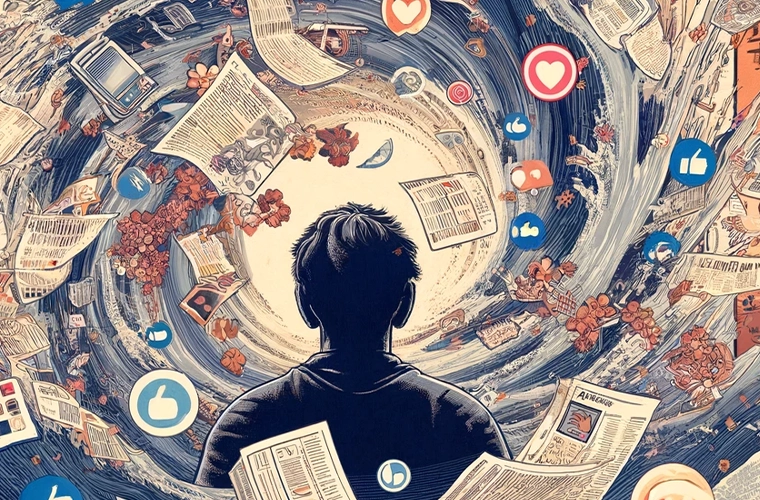New research reveals that in addition to the “truth effect”—where repeated exposure to information increases the likelihood of believing it to be true—people also experience the “illusion of knowledge effect,” creating false memories of having known repeated information beforehand.
The study findings, recently published in Cognition, highlight significant implications for the modern information age, particularly in the ability for false information and misinformation to rapidly spread through the internet and social media.
“The inability to distinguish recent information from well-established knowledge in memory adds an explanation for the persistence and strength of repetition effects on truth,” researchers wrote. “The truth effect might be so robust because people believe to know the repeatedly presented information as a matter of fact.”
Analyzing the Truth Effect and the Illusion of Knowledge
The “truth effect” is a widely researched cognitive phenomenon in which repeated exposure to information increases the likelihood of believing it to be true, regardless of its actual accuracy.
This effect occurs because the brain processes repeated information more fluently, and this ease of processing is mistakenly interpreted as a signal of truth. As a result, research has shown that people are more inclined to override rationality and accept familiar information as accurate simply because they have encountered it multiple times.
To further understand the “truth effect,” German researchers Dr. Felix Speckmann and Dr. Christian Unkelbach of the University of Cologne conducted four experiments involving 773 participants. The primary aim was to explore how repetition affects the belief in the truthfulness of information and the creation of false memories of prior knowledge.
In the first experiment, nearly 200 participants were exposed to 50 trivia statements, such as “A koala’s pouch opens rearward,” presented in two phases. During the presentation phase, 25 statements were randomly shown, followed by a judgment phase where participants evaluated both repeated and new statements, indicating whether they had known the information beforehand.
The results were striking. “Across all experiments, participants judged repeated information as ‘known’ more often than novel information,” researchers reported.
This effect persisted even when the statements were false, as demonstrated in the second experiment, where participants evaluated false trivia statements like “Golf was originally called mintonette.” Repeated false statements were also more likely to be judged as known.
The study additionally explored whether prompting participants to specify the source of their knowledge could mitigate the illusion of prior knowledge.
In experiments three and four, after participants judged statements as known, they were asked to identify the source (e.g., “I read it in a book; I saw it on television”). Yet, despite this additional step, participants rarely corrected their initial judgment, suggesting that the illusion of knowledge is robust even when probed for source attribution.
One of the study’s most striking aspects was that people would falsely create sources for their previous knowledge of repeated information. This included attributing knowledge to trustworthy sources even when the original source of the repeated information was viewed as untrustworthy.
This tendency to fabricate credible origins for knowledge underscores the powerful influence of repetition. It highlights how repeated exposure and the “illusion of knowledge effect” can alter the perception of truth and the perceived reliability of the information’s source.
“After reading a (false) statement on social media from dubious sources, people might realize that the statement is not trustworthy, researchers wrote. “However, over time, they forget the source, and if confronted with the statement again, they judge it as more truthful because they forgot the initial source (and its implications), but the increased fluency from previous exposures remains.”
“Thus, forgetting, in combination with the truth effect, could lead people to believe statements despite initially identifying them as untrustworthy.”
False Memories and the Mandela Effect
The research findings underscore the mind’s ability to create and believe false memories with solid conviction, including the bizarre phenomenon called the “Mandela Effect.”
The Mandela Effect, named by paranormal researcher Fiona Broome, describes a phenomenon where large groups of people remember an event differently from how it occurred or recall events that never happened.
Broome coined the term after discovering that many people shared her false memory of Nelson Mandela dying in prison in the 1980s, when, in fact, he was released and became South Africa’s president and passed away in 2013 at age 95.
With the “Mandela Effect,” people are not lying or being deceptive but instead have formed a genuine belief in distorted memories.
Some famous pop-culture examples of the Mandela Effect include the widespread false belief that the Fruit of the Loom logo features a cornucopia. “The Mandela Effect is real, the cornucopia in our logo is not,” Fruit of the Loom wrote on its official X account in 2023.
Another example of the Mandela Effect is the widespread belief that in the 1991 movie The Silence of the Lambs, the cannibalistic serial killer Hannibal Lecter (played by Anthony Hopkins) greets FBI agent Clarice Starling (played by Jodie Foster) with the phrase “Hello Clarice” when they first meet. In truth, Lecter says “Good morning,” and “Hello Clarice” is never uttered in the film.
Dr. Speckmann and Dr. Unkelbach’s recent findings suggest that phenomena like the Mandela Effect might be partly explained by the repetition of false information or misassociation of informational sources.
For instance, though the phrase never appeared in The Silence of the Lambs, in a scene from the 1996 film The Cable Guy, actor Jim Carrey comically imitates Hannibal Lecter by placing meat on his face and saying the famous misquote, “Hello Clarice.”
Similarly, in the famous “red pill or blue pill” scene in the 1999 movie The Matrix, Morpheus (played by Laurence Fishburne) never says, “What if I told you everything you knew was a lie,” while discussing the true nature of reality to Neo (played by Keanu Reeves). Nevertheless, droves of people ardently remember Morpheus saying the phrase, sparking internet discussions on how it must have been later edited out of the film.
In actuality, the phrase, “What if I told you everything you knew was a lie,” only appears in a widely shared meme featuring an image of Morpheus, first shared in 2012 on Reddit.
The results of Dr. Speckmann and Dr. Unkelbach’s research suggest that the mass false memories of these infamous movie quotes are due to people being more frequently exposed to Jim Carrey’s “Hello Clarice“ or the Morpheus meme than the actual films themselves.
This repeated exposure, through social media, the internet, etc., fosters the “illusion of knowledge effect“ and the development of false memories that feel as real as true memories.
Addressing the “Truth Effect“
The impact of forming false memories of movie quotes is negligible. However, there are other aspects where the “illusion of knowledge effect“ can have much more significant consequences. This is particularly true in today’s digital world, where true and false information can be disseminated at unprecedented rates.
Social media platforms, in particular, are breeding grounds for spreading the repetition of misinformation. The truth effect can thus significantly impact public opinion and belief systems.
Moreover, social media content is often shared based on emotional reactions rather than factual accuracy. As people repeatedly encounter the same false information, they become more likely to believe it, and through the “illusion of knowledge effect,“ they falsely remember it as accurate.
This can be further exacerbated by algorithms prioritizing sensational content, leading to frequent exposure and reinforcement of false narratives.
Understanding the mechanisms behind the truth effect is crucial for developing strategies to combat misinformation. One approach is improving media literacy, helping people recognize the importance of verifying information and understanding how the brain establishes truth.
“Most statements we read online should become part of semantic memory rather than episodic memory. However, because source information is less easily retrievable in semantic than in episodic memory the source substitution might start relatively early after the first exposure,“ researchers wrote. “This would explain why people believe statements from lying sources and statements with questionable content.“
Ultimately, Dr. Speckmann and Dr. Unkelbach’s research sheds light on the profound impact of repeated information on our perception of truth and memory.
As we navigate an era of digital information overload, understanding and addressing the truth effect is essential for fostering a more informed and discerning public.
The study’s insights emphasize the need for critical thinking and verification in an age of abundant information but often elusive truth.
Tim McMillan is a retired law enforcement executive, investigative reporter and co-founder of The Debrief. His writing typically focuses on defense, national security, the Intelligence Community and topics related to psychology. You can follow Tim on Twitter: @LtTimMcMillan. Tim can be reached by email: tim@thedebrief.org or through encrypted email: LtTimMcMillan@protonmail.com

